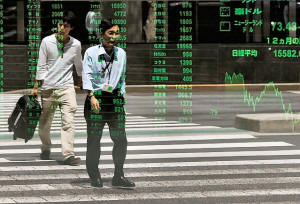|
European shares hit two-week lows, yen
rises as Japan backs stimulus
 Send a link to a friend
Send a link to a friend
 [August 02, 2016] By
Kit Rees [August 02, 2016] By
Kit Rees
LONDON (Reuters) - European stocks fell to
two-week lows on Tuesday, dragged down by banks, while the yen rose
against the dollar and government bonds sold off after Japan's cabinet
approved a fiscal stimulus package to revive the flagging economy.
Oil fell again, with U.S. crude dipping below $40 a barrel as a supply
glut weighed on prices.
The pan-European STOXX 600 index fell 1.4 percent, hurt by a 3 percent
fall to three-week lows in banks. They extended Monday's losses after
Europe-wide stress tests on 51 European lenders cast doubts on the
health of the sector.
Credit Suisse fell 5.6 percent and Deutsche Bank 3.2 percent after index
provider STOXX said the two banks would be dropped from Europe's STOXX
Europe 50 index from next Monday.
Germany's Commerzbank shares reached a record low, down more than 8
percent after it warned its earnings would fall this year because of
customer caution and negative official interest rates.
Italy's Monte dei Paschi fell 6 percent and UniCredit 4 percent.

MSCI's broadest index of Asia-Pacific shares outside Japan was down 0.4
percent, after the S&P 500 ended Monday 0.1 percent lower, despite
reaching an intraday record high.
Australian shares fell 0.8 percent after the Reserve Bank of Australia
cut its main interest rate by 25 basis points to a record low of 1.50
percent, as expected. Hong Kong trading was suspended as Typhoon Nida
shut down most of the financial hub.
Sliding oil prices and the stronger yen pushed Tokyo's Nikkei index down
1.5 percent.
The yen rose to its strongest in three weeks at 101.60 per dollar after
Japanese Prime Minister Shinzo Abe's cabinet approved on Tuesday 13.5
trillion yen ($132.04 billion) in fiscal steps as part of efforts to
revive Japan's economy.
Last week, the Bank of Japan announced further easing steps, which
disappointed investors who had hoped for more.
"There's quite a lot of scepticism in the market as to whether this
fiscal package can change anything. Japan has already tried this a
number of times and everyone knows it's not really as big as the
headline figure suggests," said Alvin Tan, a strategist at Societe
Generale.
[to top of second column] |

Passersby are reflected on a stock quotation board outside a
brokerage in Tokyo, Japan July 11, 2016. REUTERS/Issei Kato

"What was exciting over the past month was the potential for
monetary policy to act in coordination with the fiscal measures and
we were definitely disappointed on that front last week.
Coordination still seems a good way off."
Japanese government bonds suffered their worst sell-off in more than
three years on fears the BOJ would slow its bond-buying.
That had a knock-on effect in the euro zone, where government bond
yields rose across the board. German 10-year yields, the benchmark
for borrowing costs in the bloc, rose 2.2 basis points to minus 0.13
percent.
The dollar held near three-year lows after soft U.S. economic data
on Monday undermined the case for an early rate increase by the
Federal Reserve.
The dollar index against a basket of six major currencies fell 0.3
percent. It recorded its biggest decline in three months last week
and has since struggled to recover.
The Australian dollar fell as low as $0.75 after the RBA decision,
then recovered to trade up 0.3 percent at $0.7560. Australian shares
were 0.6 percent lower.
U.S. crude oil futures slipped back below $40 a barrel. They fell to
their lowest level since April on Monday on worries that a global
oil glut is undercutting prices. [O/R]

(Reporting by Kit Rees, additional reporting by Patrick Graham,
editing by Larry King)
[© 2016 Thomson Reuters. All rights
reserved.]
Copyright 2016 Reuters. All rights reserved. This material may not be published,
broadcast, rewritten or redistributed. |